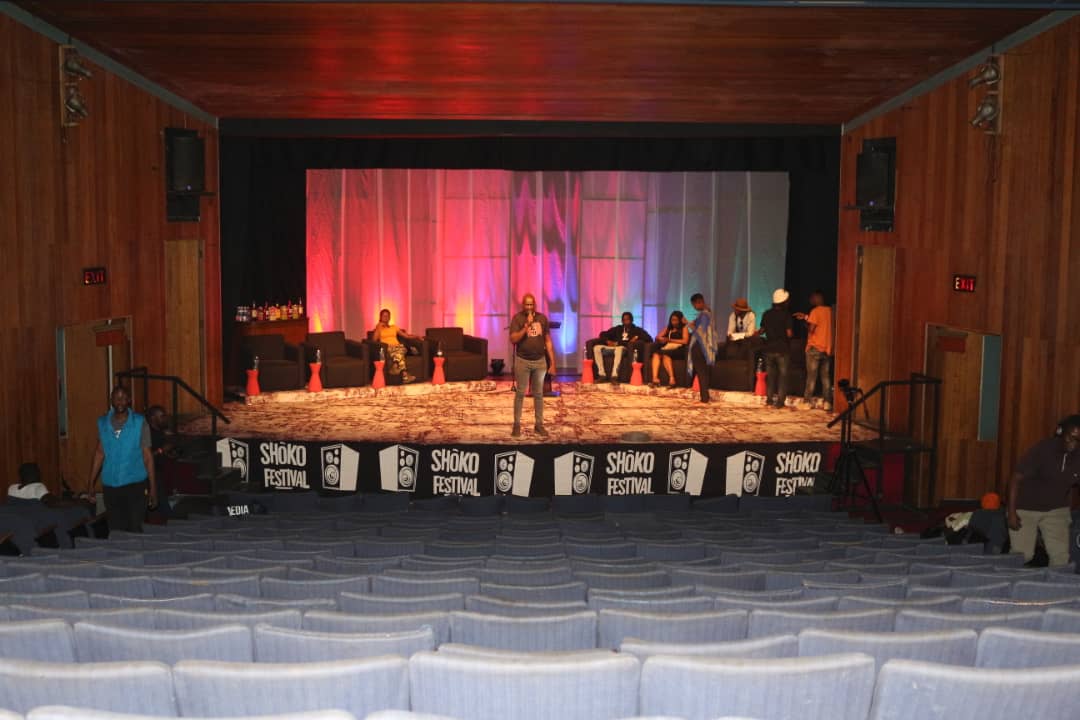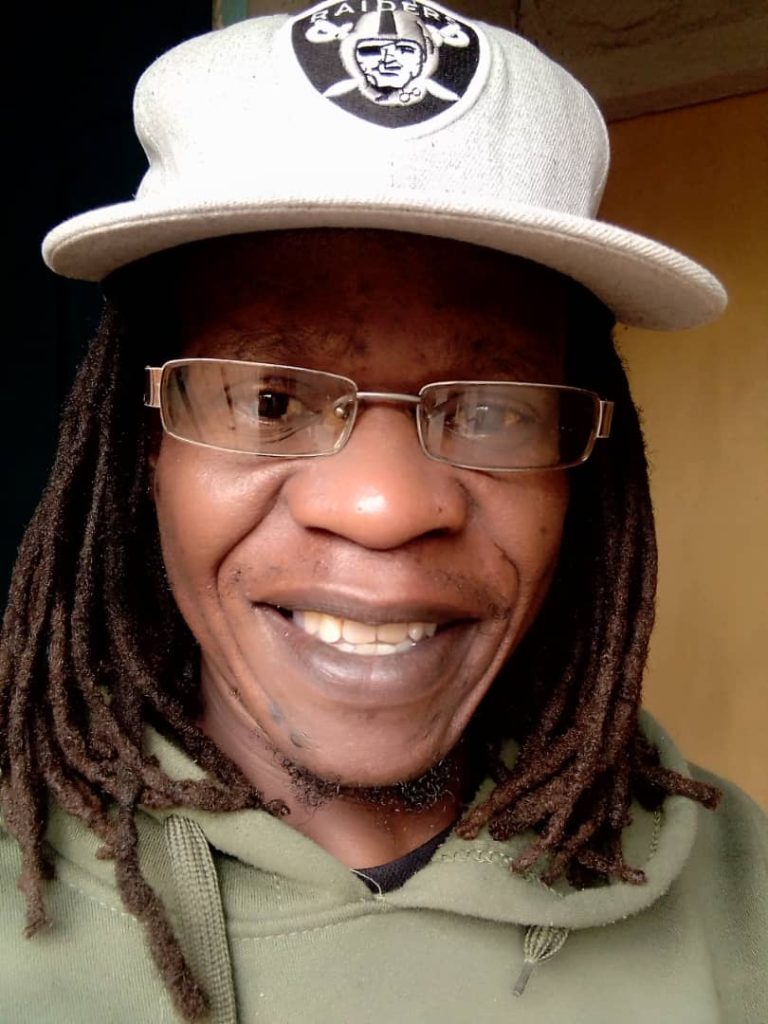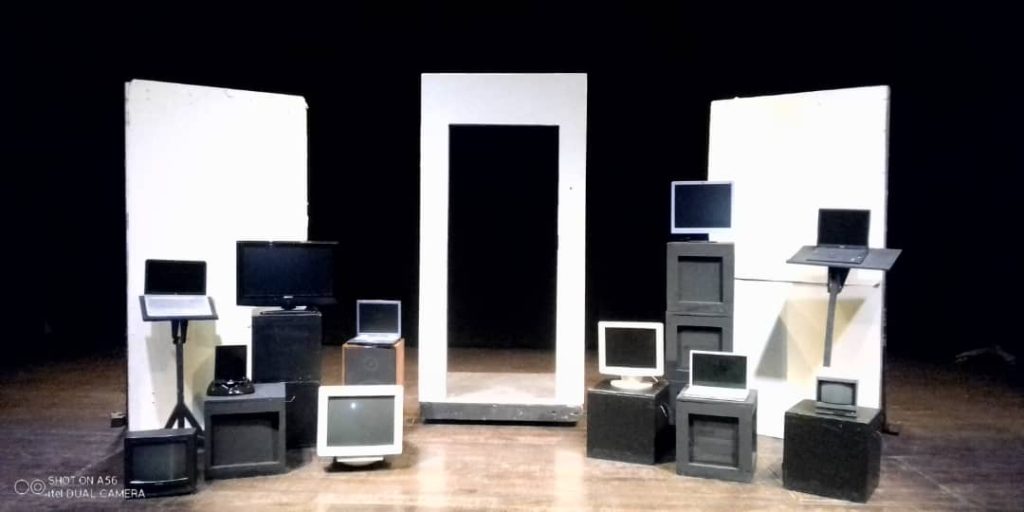
Zimbabwean designer Josh Changa creates worlds and aesthetics so believable that they tell stories on their own. He is a set and production designer who has carved his name into an indelible brand on the local block, pun intended.
Despite his distinguished exploits and achievements, Josh Changa, like many other “below the line” workers in the industry, will not be awarded any form of recognition or appreciation from the industry he has diligently served. The country’s main arts awards have no categories that reward his discipline.
For over a decade, he has worked on some of the biggest and most important local sets for both film and theatre, including HIFA and the Cook-Off movie, yet his name remains largely obscure, uncelebrated, and undiscovered outside his small circle of professional contacts.
Following Josh Changa’s (JC) successful set design for the ever-growing Shoko Festival, My Afrika Magazine reporter Elias Muonde (EM) had an exclusive interview with the dreadlocked artist to discover the method behind his finesse.
EM: Over ten years of consistent work in the industry is a milestone. Let’s start by
looking back from right where it started; was set designing an intended career or it was circumstantial, or even accidental as in most cases?
JC: I would say art chose me from a tender age and I dabbled in almost all forms of art until I became one of Helen Lieros’ students at Gallery Delta. Being an artist meant I was constantly surrounded by my kind too…so my first brush with set designing was through Stanley Mambo and Marian Kunonga on Sani Makhalima’s Sisonke video. It ignited the desire to delve deeper into set design, props, etc. Then I met Carine Tredgold who became my mentor in both film and theatre set designing. It’s been a journey with Carine until she weaned me as she believed I had grown enough to stand on my own.
I was very nervous about my first job being boss and the project was being directed by Tsitsi Dangarembga! I pulled through and I have never looked back ever since. Then I started learning about production design and this opened a whole new world for me as it finally worked together with set designing and finally made me understand and appreciate how it adds value to either film or theatre.
EM: Some of your sets involve woodwork and one can’t afford to ignore the fine handiwork the sets exude. Did you go to school to specifically train in carpentry?
JC: On some jobs that involve wood or metal, I engage people who are qualified for that, though I must be present to make sure we are on the same page with the craftsman. I did metal work at school but for one to be a set designer that really is not very important. Being able to create and draw images though is of paramount importance.
EM: What are some of the important elements you consider when designing a set?
JC: You need to read and understand the script then discuss the script with the director, do sketches of the proposed set to scale, present to the director, and upon approval start working on the actual set, i.e. for theatre. For the film, we usually use pre-existing locations so usually you discuss with your boss (Production Designer) or simply follow instructions.
EM: Do you have a signature style?
JC: Not really, I lost interest after I realized that no acknowledgments or accolades were in honor of this specific trade. I used to subtly hide my initials in my work such that if I were to tell you where they were you would see them.
EM: Lack of intentional recognition for one’s “labor of love” can be frustrating. With such experiences, do you still feel you are a part of the arts community, or do you consider yourself frustrating the wall when it comes to the general conversation and politics of the industry?
JC: Art is in my DNA. So as much as it’s frustrating, I am and will always be part of the arts community. I might adjust my focus on something else if it is rooted in art.
EM: What’s the most challenging set design you have ever worked on?
JC: Every theatre set is a challenge. The reason is probably that it’s never been done before, and you’re not sure if it can be pulled off throughout the production period. The same applies to film, somehow availability of resources is usually a challenge in Zimbabwe unlike in South Africa. In Zim, your set might be affected negatively simply because some of the elements you need are not readily available and your budget is tight such that you cannot import. So yeah, every set should be a challenge and every set is different, the same as every director has their own way of directing.
EM: How do you deal with a scenario of a very demanding producer vs a limited budget?
JC: I ask myself if it’s worth it. If it’s not, I simply let it pass as such jobs demand the most out of you both mentally and physically. I am past that stage where I must work in the worst of situations because I need exposure, LOL. All my notable jobs are on IMDb!
If they don’t have the money, then they shouldn’t do it. One needs to be careful when taking up jobs; you are only as good as your last job most times. Some jobs might have a good salary but at the same time put your work in a negative light. So, one must be cautious of what they are getting themselves into before committing.
EM: You lamented about the lack of recognition for the craft at the awards level. Is it the same experience when it comes to remuneration? Has the income been sustainable for you so far?
JC: People, or producers rather, want the best product out of the least budget and I have been known to turn a cat into a lion! I have also been painted as costly to hire which automatically means fewer if any jobs coming my way. So I had to start learning new skills such as camera operation, editing, and drone piloting amongst others.
EM: Finally; from your industry point of view, is Zimbabwe heading in the right direction in terms of being a fully-fledged, sustainable creative economy in the near future, or we are stuck in the same rut of yesteryear’s perennial woes?
JC: More and more people are now collaborating as much as possible which is a plus. So, the more collaborations, the more growth there will be and the more noise we will make internationally until we are heard! We should keep wanting more out of our chosen fields, research, and more research. Practice and more practice. Move with the trends! Imagine most directors really don’t know what Production Design entails and they don’t even bother to research on it, yet they are directors who have won awards! So, yeah, we are slowly getting there. We just need to package our work for international consumption which automatically means we must follow international standards as well!
FB/ #joshchanga
IG/ josh changa
IDMb/ josh changa




